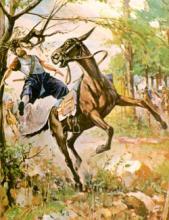As the story of David approaches its end, there is a sense of weariness throughout the text. Though David had never been a particularly wrathful figure throughout his life, in those final years when his leadership was constantly in question he was particularly unwilling to exact vengeance of any sort regardless of how egregious his enemies were. David's sympathy and fairness are why, despite his failings, we still talk about him as if he was an admirable figure. Unlike Saul, David is never entirely consumed by the cruelty of the world or the disturbing ease of destruction afforded to him by his throne. David's early years are all about elevating him from his low, unassuming origins and his later years are all about humbling him. The admirable thing about David isn't that he's an unbeatable warrior, a singular poet or even a favorite of God. His greatest quality is his tenderness, his ability to find mercy and justice when he has every reason to bring down the full force of his crown.
With the killing of Absalom, it becomes strikingly apparent that there are no good deaths in the Books of Samuel save for those that are barely mentioned. In fact, throughout the Torah there are no real descriptions of glorious deaths. There are no heroes who fall valiantly in battle or bravely in martyrdom. All stories of respectable, violent deaths in Jewish culture come much later with moments like the Bar Kokhbah Rebellion or the heroes of the War of Israeli Independence. In the roundly moral document that is the Mishnah, the only good death is a quiet, natural one that is treated with little mention beyond a figure's passing and the requisite mourning of those around him or her. This is because Judaism does not value death. At best, it is merely a natural stage of existence that is never meant to slow down or preoccupy life. Even the Jewish period of mourning is only eight days long. In the Torah, only terrible, unnecessary deaths are drawn out, and always for a reason.
Absalom dies not in battle, but by a combination of fate and cruelty. The final battle between the Judean forces supporting David and the Israel-backed contingent of Absalom takes place in the forest of Ephraim, likely not a coincidence since Samuel himself was of the House of Ephraim. The text states "For the battle was there spread over the face of all the country; and the forest devoured more people that day than the sword devoured." Through one means or another, nature claimed the lives of the combatants for the country, an oblique but not opaque reference to the overall disapproval of God. The very country, in the forest named for the house of its most trusted prophet, killed those who would rend the nation that had already shed so much blood to achieve unification. Absalom gets caught in the branches of a terebinth, or tiferet, tree, a symbol that would later be used as a great symbol in Jewish mysticism. It should also be noted that David fought Goliath in a place called "The Valley of the Terebinth". While hanging, Absalom is found by David's advisor Joab. Going strictly against David's orders, Joab and his men kill and bury Absalom. It is a slow, cruel and utterly dishonorable death, simultaneously to be pitied and mourned.
And David does indeed mourn, just as he mourned for Saul and all of his other enemies. After all, Absalom was still David's son. David was gifted in battle, but he never loved battle. Every kill was pain to him. As with every death over which he presided, David has to be convinced to assume his kingly duties during his mourning. When it comes time to put his country in order, David judges those that come before him with more mercy than would have seemed prudent. There is no place for wrath in David's heart, which is one of the most frequent lessons of leadership in the Torah. All of the great leaders, from Abraham to the end of the Mishnah, are either punished for their wrath or show no stomach for it. These moments of mercy are David's finest and they serve as the example of his great contribution to our written tradition.
